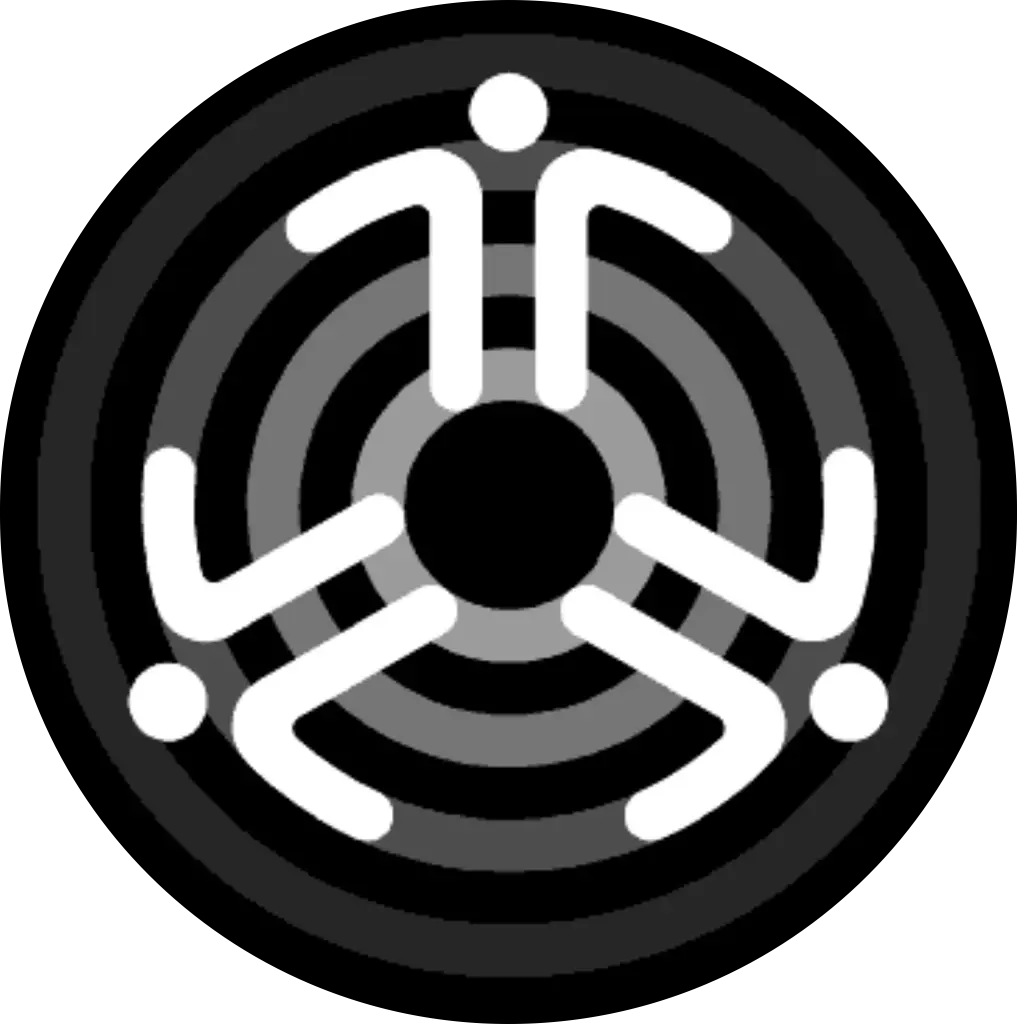The Society of Computer Users (SCU) was founded in 1990. At the time of its creation, personal computers (whether Apple Macintoshes, IBM machines or IBM-compatible machines) were quite expensive, online communications were more dream than reality (there was no Internet access in Trinidad and Tobago) and software could only be had at a premium price. The SCU had an ambitious mission: to be a user-friendly outlet in the distribution of computer related information to the general public.
(more…)Category: articles
Miscellaneous computer related articles, opinions and essays by fellow TTCS members.
-

TTCS meeting on October 11 2008 – TTCS Comments on Draft National E-business policy of Trinidad and Tobago
Note : May 14 2013 : this page makes references to the TTCS wiki in use at the time which is no longer in use. We’ve added local copies of the documents mentioned for reference.
- Draft National Policy on Electronic Business for Trinidad and Tobago (PDF ; 745K ; 25 pages)
- TTCS comments submitted on “Consultative Document on a Proposed Policy Framework for e-Business in Trinidad and Tobago” (PDF of Google Doc)
————————
Update (20 Oct 2008) – comments submitted. View the Google document of the questions and our submitted answers.
The Trinidad and Tobago Computer Society will be having a meeting on Saturday October 11th, 2008 from 1pm to 5pm at Engineering Consultants at 112A Edward Street, Port of Spain.
At this meeting, we will be framing our response to the proposed National E-business Policy of Trinidad and Tobago (PDF ; 745K ; 25 pages) . The deadline for comments is Monday October 13th, 2008.
However, you can make and review the existing comments BEFORE the meeting on the TTCS wiki page on the Draft National Policy on Electronic Business for Trinidad and Tobago .
To add/modify comments on the TTCS wiki page, just select the “Edit this page” button. At the login screen, the wiki password is “ttcswebwiki” ; enter your name and email address to proceed to add/edit the comments on the Draft National Policy on Electronic Business for Trinidad and Tobago.
Comments to the Ministry of Public Admin must use the fastforward’s e-Town Hall Website at http://ebusiness.fastforward.tt/business/townhall
- Draft National Policy on Electronic Business for Trinidad and Tobago (PDF ; 745K ; 25 pages)
-
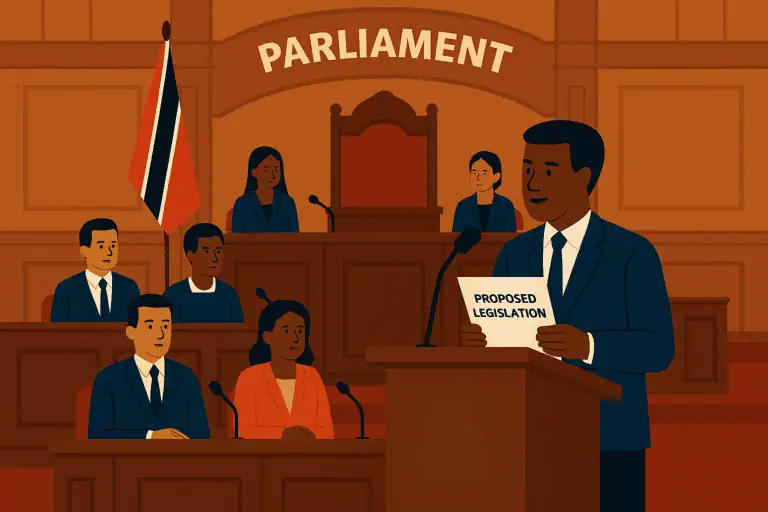
Electronic Transactions Bill 2008
The Electronic Transactions Bill 2008 was introduced to the House of Representatives in September 2008. It “seeks to provide for the transfer of information and records by electronic means”.
However the bill lapsed in Dec 2008 with the end of the Parliament session.
- View / Download The Electronic Transactions 2008 (PDF ; 110K)
-
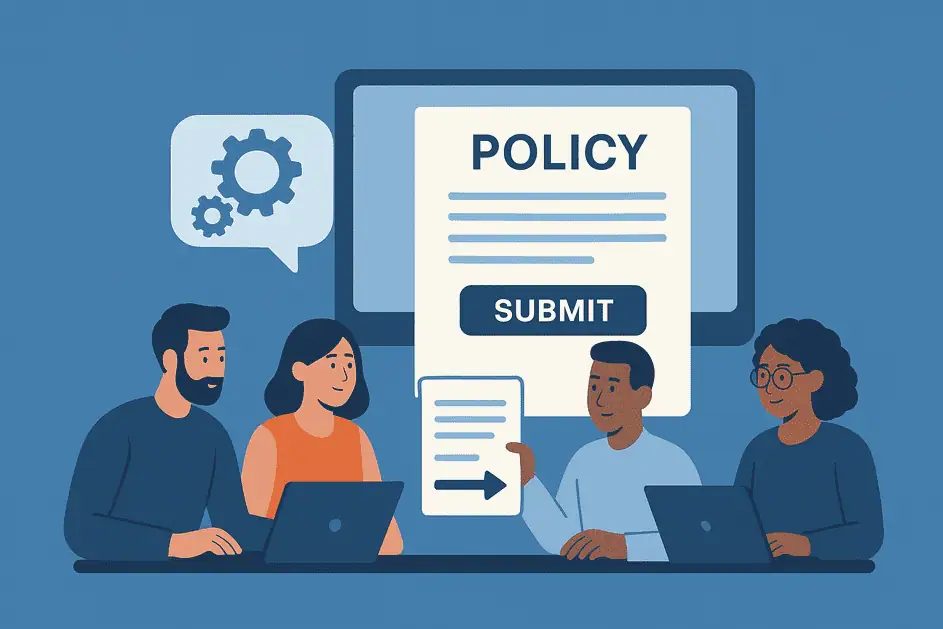
TTCS recommendation to Trinidad and Tobago Bureau of Standards regarding its vote on DIS29500
As a member of the Trinidad and Tobago Bureau of Standards (TTBS) Information Technology Committee, the Trinidad and
Tobago Computer Society (TTCS) ) submitted its recommendation on DIS29500 aka OpenXML on March 6th 2008 as per the deadline set by the TTBS.You can view our recommendation online at
https://files.ttcs.tt/comments/TTCS-recommendation-on-DIS29500.pdf (PDF ; 201K).Previous posts on DIS29500 :
- TTCS invited to Trinidad and Tobago Bureau of Standards IT committee to work on ISO/IEC JTC 1 matters
- Trinidad and Tobago and DIS29500
- TTCS wiki page on DIS29500
Other members of the TTBS IT committee have also made recommendations to the TTBS on whether the TTBS, as a result of being a Participatory Member in ISO/IEC JTC1 SC34 can either approve, disapprove or abstain from voting on DIS29500 to be a ISO standard.
There will be a TTBS IT committee meeting on March 13th, 2008 to discuss the recommendations received. After, the TTBS will decide and will inform the IT committee on its decision by March 20th, 2008. (Update 22 March 2008 ; the TTBS stated it will “change its vote from abstention to approval” of DIS29500)
For the first time since the TTCS has submitted comments on various IT related policies in Trinidad and Tobago, we used Google Documents to create and edit the recommendation 1,195 times before the document was complete. This has worked well compared with sending emails of different document versions back and forth, and the TTCS will probably use this facility for future submissions similar to these and other IT related policies.
-
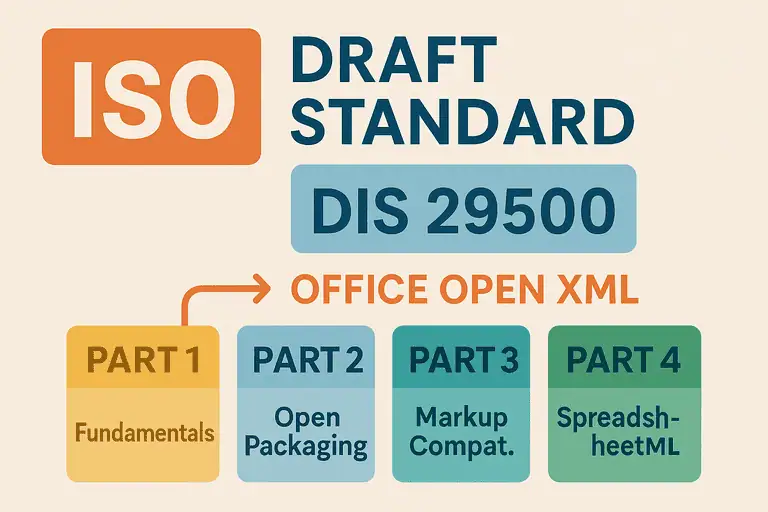
TTCS wiki page DIS29500
Note: This is the contents of the TTCS wiki page ‘DIS29500″ from 2008 moved from ttcsweb.pbworks.com
The Trinidad and Tobago Computer Society (TTCS) has submited its recommendation regarding OOXML to the Trinidad and Tobago Bureau of Standards (TTBS) on March 6th, 2008. You can view the PDF at http://www.ttcsweb.org/articles/computer-laws/TTCS-recommendation-on-DIS29500.pdf (PDF ; 201K)
About DIS29500
DIS 29500 refers to Draft International Standard #29500 which is currently the subject of the fast-track standardisation process at the ISO/IEC JTC1.
This draft seeks to make the Office Open XML also known as OOXML or OpenXML format (created by Microsoft) an international standard for electronic document formats.
The DIS29500 specification that was submitted to ISO for a vote on September 2007 can be downloaded from: http://www.ecma-international.org/publications/standards/Ecma-376.htm
It has several parts :
- Office_Open_XML_overview.pdf
- Office_Open_XML_Part1_Fundamentals.pdf
- Office_Open_XML_Part2_OpenPackagingConventions.pdf
- Office_Open_XML_Part3_Primer.pdf
- Office_Open_XML_Part4_MarkupLanguageReference.pdf
- Office_Open_XML_Part5_MarkupCompatibilityExtensibility.pdf
The DIS29500 specification is around 6,000 pages.
In a September 2007 ballot, ISO/IEC national body members were called upon to vote. The draft version failed to obtain the number of votes required for it to be accepted as a standard.
The Trinidad and Tobago Bureau of Standards (TTBS), which became a P-status voting member before the vote, cast an “abstain” vote.
After the September 2007 vote at ISO, there were over 3,000-3,500 comments from National Bodies ; you can view those on sites like http://www.dis29500.org/
On January 15th, 2008, ECMA has submitted its disposition of comments/changes to DIS29500 to ISO after ECMA’s review of the 3,522 National Body comments raised on the DIS 29500 ballot in September 2007. That document is 2,293 pages, you can see a summary of what was changed at : http://www.ecma-international.org/news/TC45_current_work/Proposed+dispositions+for+National+Body+comments+on+DIS+29500+complete.htm
Note this document can be found at: http://www.itscj.ipsj.or.jp/sc34/def/0980c.htm for ISO member bodies ; the name of the document is DIS29500-2008-002.pdf
A Google Search turned up an un-official copy via : http://www.noooxml.org/ and http://www.glove.org.ve/extras/DIS29500-2008-002.pdf (PDF ; 19.1MB)
Some of the concerns posted to the TTCS Discussion list appears to be addressed.
ECMA’s disposition of comments/changes to DIS29500 will be considered at the BRM (Ballot Resolution Meeting) to be held in Geneva at the end of February 2008. See the BRM FAQ at : http://www.jtc1sc34.org/repository/0932.htm. Also see the ISO’s press release about the BRM (20-02-2008)
A Draft Agenda of the Ballot Resolution Meeting (released 2008-01-24) has been posted by SC34 : http://www.itscj.ipsj.or.jp/sc34/open/0933draft-rev1.htm
After this BRM, National Bodies which voted in September 2007 (and thus the Trinidad and Tobago Bureau of Standards) will have an opportunity to change their September 2007 vote within 30 days to either approve, disapprove or abstain.
Background/related links about DIS29500
Wikipedia entry on DIS 29500 – gives some background of the controversy behind DIS29500.
ODF vs. OOXML and the Future of the Great Powers of IT – An EXCELLENT, informative article on the background behind document standards, the battle between Microsoft and its rivals, the history of ODF and OOXML at ISO and possible outcomes of the standards battle. A PDF version of this article (PDF ; 258K) is available.
Groklaw’s collection of resources regarding OOXML and ODF – lots of information here
ECMA Press release on the completion of dispositions of National Body comments on DIS29500 (2008-01-14) : “The ISO/IEC DIS 29500 Project Editor, with the help of Ecma TC45, is publishing the Project Editor’s Report of Proposed Dispositions. This completes TC45’s review of the 3,522 National Body comments raised on the DIS 29500 ballot in September, and its preparation of proposed dispositions in support of the Editor.”
Brian Jones: Open XML Formats – Brian Jones is a progam manager of MS Office at Microsoft. His blog ‘s primarily deals with OpenXML and mentions some of the changes being made to DIS29500 that will be submitted to ISO before the BRM. Some of the blog posts :
- Mapping documents in the binary format (.doc; .xls; .ppt) to the Open XML format . (2008-01-16)
- 500+ national body comments posting today (2007-12-21) – post describes some of the changes to DIS29500 due to ECMA’s consideration of ISO comments from Sept 2nd, 2007
Alex Brown blog – the SC34 convenor of the DIS29500 BRM
LWN.net : Gnome and OOXML : article about GNOME’s involvement with OOXML
YouTube OpenXML channel – videos from Microsoft which has various videos regarding OpenXML including demos and interviews.
TTBS activities in preparation for voting on DIS29500
The Trinidad and Tobago Bureau of Standards (TTBS) has setup a IT committee comprising of organisations/groups outside of the TTBS which will advise/recommend on IT related ballots that the TTBS has to vote on due to its Participatory status. The Trinidad and Tobago Computer Society (TTCS) was invited to join the Trinidad and Tobago Bureau of Standards IT committee to work on ISO/IEC JTC 1 matters in November 2007 :
The TTBS will be having a forum on DIS29500 on February 19th, 2008 to provide a wider source of information about OpenXML and guide TTBS in finalizing a formal position on DIS29500.
At the recent committee meeting on Thursday 31st January, 2008, the idea for a forum hosted by the TTBS was scrapped.
Debate within the committee has focused on :
The criteria can/should be used to evaluate OpenXML and other ISO standards and how to quantify/measure whether such standards have met the criteria.
At the 7th IT committee meeting on Thursday 21st February 2008, the following deadlines were established :
March 6th, 2008 is the final day for submission of comments to TTBS by the IT committee members on the OOXML standard.
The Comments submitted should clearly indicate the final position.
March 13th, 2008 is the date for the next TTBS IT committee meeting to finalize a committee position on this standard.
TTBS will indicate its position by March 20th, 2008.
Proposed criteria to evaluate OpenXML by the TTBS
This list was first circulated on 2008-01-31.
The following is a proposed list of criteria which can be used to evaluate the proposed OOXML Standard to determine if it can be considered an “open standard”.
- Open Life-Cycle – A format development process having an open life-cycle means the format is evolved in a fashion that is open to public and where all participants, individuals as well as companies, have a voice in consensus decision-making on the standard’s technical make-up. An open standard should be platform and vendor-neutral. Multiple implementors working on multiple platforms is essential.
- Open Availability – An open format is published in its entirety in a specification document which is freely available and easy to comprehend. Open Availability also means that a format is freely available for implementation in software.
- Multiple Implementations – An open document format can and will be designed in to many different software applications without practical, technical, legal or other impediments.
From a different perspective it is fair to say that an open format has the characteristics that attract multiple implementations. If one had no other way to tell, the format specification with the greater number of complete implementations likely follows open principles more rigorously and will better deliver information free-flow between applications and platforms. - Interoperability Across Different Systems – Perfect interoperability across different systems means a format can be fully implemented in any application, regardless of the platform or system on which that application operates. Every respective system would be able to access a document’s content and layout parameters to provide perfect document fidelity to the original.While neither ODF or OOXML offers perfect interoperability, we can judge each one’s performance based on its proximity to perfection as well as its potential to reach a high practical level of interoperability for business processes. It is sufficient that an open document format should be easily read, authored and edited from within different system environments and across different applications. Content should be transmitted without loss and presentation layout should be rendered with fidelity by alternative applications operating on different platforms.
Background/related links about ISO/IEC JTC1 SC34
The TTBS became P-status voting member in ISO/IEC JTC1 SC34 around July 2007.
ISO/IEC JTC 1 Directives, 5th Edition, Version 2.0 : http://www.jtc1sc34.org/repository/0725c.htm
Upcoming standards in SC34 that TTBS has to vote on
Since December 2007, the JTC1 SC34 website is now located at http://www.itscj.ipsj.or.jp/sc34/
The list of proposed ISO standards in SC34 which require Trinidad and Tobago to consider and vote on because of its recent Participatory Status is now located at : http://lucia.itscj.ipsj.or.jp/itscj/servlets/ScmBlt10a?Com_Id=34
Before December 2007, upcoming ISO standards which require Trinidad and Tobago to consider and vote on because of its recent Participatory Status were lcated at: http://www.jtc1sc34.org/document/secretariat_temp.html#calballot (warning : large page)
The Trinidad and Tobago Bureau of Standards (TTBS) is a P-status member in SC34 and must therefore consider draft IT standards and vote accordingly.
The response from the TTBS to a draft standard can be:
- Approval of the Draft as Presented
- Approval of the Draft with comments as given on the attached
- Disapproval of the Draft for reasons
- Disapproval (appropriate changes in the text will change vote to approval)
- Abstention (with reasons)
- No response
How you can help TTCS with this issue
The TTCS welcomes your questions, thoughts, comments and suggestions regarding DIS29500 and on the proposed criteria to be used to evaluate OOXML. If you can assist with technical understanding and analysis of DIS29500, this is also needed and appreciated. You can edit this page or send email to admin@ttcsweb.org.
The TTCS has submitted its recommendation to the TTBS on March 6th, 2008. You can view the PDF at http://www.ttcsweb.org/articles/computer-laws/TTCS-recommendation-on-DIS29500.pdf (PDF ; 201K)
We still welcome comments on our recommendation or on DIS29500 itself as there will be a Bureau of Standards meeting on March 13th, 2008 to discuss comments made by other members of the Bureau of Standards IT committee.
Your thoughts/comments/suggestions regarding DIS29500
Have questions/comments/suggestions about DIS29500 and how the TTBS should be handling DIS29500 and other SC34 issues? Edit this page and add them here!
Comments by Richard Bailey – Feb 9, 2008
In addition to the merits of the standard and it’s development, consideration should also be made about how the standard applies to Trinidad and Tobago. The criteria listed above are not T&T specific and it is my belief that that if the TTBS is to endorse any standard the TTBS should ensure that the standard is aligned or caters for the ways that Trinidad and Tobago operates. In fact, this should be the focus in any standard evaluation process, and should be weighted above and beyond criteria that discuss the openness or interoperability.One simple example is “Does the standard allow for UK English spelling while allowing US paper sizes?” This may seem trivial but this simple combination of a mixed locale is not yet available in some widely deployed systems such as Ubuntu. There may be other aspects of this particular 6000+ page standard that should cater for Trinidad and Tobago’s other chosen standards, and it should be the committee’s responsibility to verify this.
-
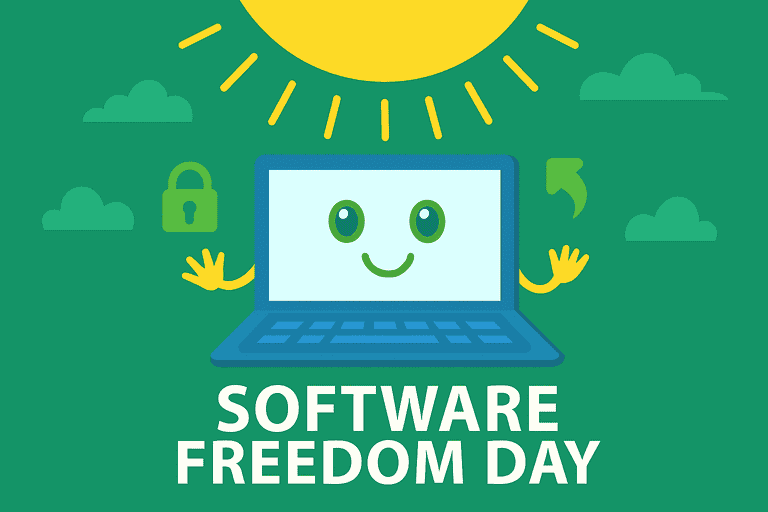
Software Freedom Day 2007 report
Introduction
Software Freedom Day (SFD) is a global, grassroots effort to educate the public about the availability and benefits of Free and Open Source Software (FOSS). Local teams around the world organise events on the third Saturday in September. In 2007, Software Freedom Day was celebrated on September 15th.
The Trinidad and Tobago Computer Society (TTCS) organised meetings in 2005 and in 2006 to promote free and open source software, but did not register with the official Software Freedom Day website.
This article is a report on the planning that went into SFD 2007, a overview of the presentations made on the actual day and various photos and video clips from SFD 2007.
Preparations for SFD 2007
The TTCS registered as a team on the Software Freedom Day website in mid-July 2007 at :
- http://www.softwarefreedomday.org/teams/caribbean/ttcs and
- http://www.softwarefreedomday.org/TrinidadTobagoComputerSociety
We received materials and CDs from the Software Freedom Day organisation during the last week of August. During that week, the venue for the event was confirmed as Hand Arnold (Trinidad) Limited, El Socorro Road Extension, El Socorro, San Juan, Trinidad. TTCS has held some of its previous tech meetings at this location.
Planning for the event began via phone calls and email among members of the TTCS and we decided that the time for the SFD event would be from 1pm to 6pm. Plans were made for the following:
- a flyer with information about the TTCS, TTCS OSSWIN CD (our CD compilation of open source software for Windows), Ubuntu and open source to be given to persons on SFD. To minimise costs, it would use a single sheet of paper.
- a one page flyer to promote SFD – this would be put online for TTCS members to download and distribute to the public. This had to be done before 7th September 2007.
- a letter to send via postal mail to secondary schools. The letter to schools should:
- introduce the TTCS
- tell them about Software Freedom Day
- mention if they attend, they would receive an Ubuntu and a TTCS OSSWIN CD free of charge and get to see demonstrations of the software and learn more about opensource.
- ask them to reply via email to confirm if they are attending
- promote SFD via the TTCS Facebook group and other computer related email lists.
- at least three computers to be available on SFD to demonstrate Ubuntu and open source software for Windows.
- a meeting on September 8th, 2007 to prepare machines for SFD, to meet with volunteers willing to help with the event.
3rd September – 8th September 2007
The week from the 3rd September to the 8th September was very busy with many emails passing between the TTCS members who would be running the SFD event. A wiki page was created at http://ttcsweb.pbwiki.com/SFD to help with the planning for SFD including the text of the letter for schools, the email text to be posted to various mailing lists and various Linux distros to have on hand at SFD
The TTCS Software Freedom Day flyer (PDF ; 180K) to promote the TTCS SFD event was made available online :
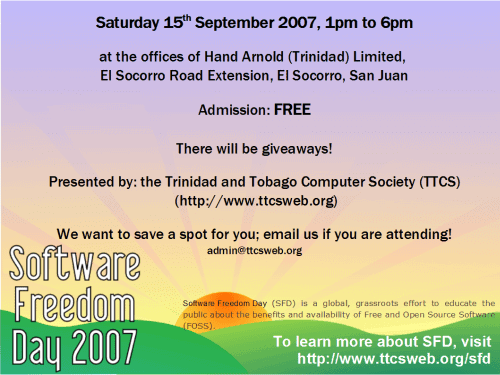
A TTCS FOSS tri-fold brochure (PDF ; 654K) about Free and Open Source Software was done (it is a modified version of a brochure from http://geekosophical.net/misc/sfd/ and also made available online.
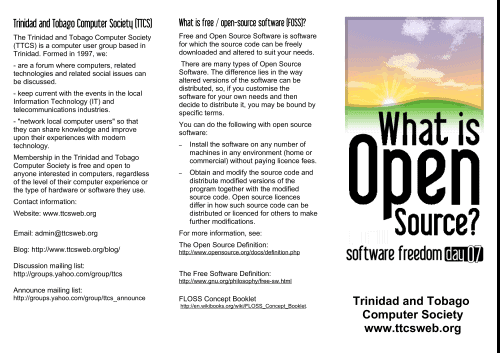
The official TTCS Software Freedom Day webpage at http://www.ttcsweb.org/sfd was completed and the TTCS home page also carried the announcement of the Software Freedom Day event.
The event was also announced on the Facebook social network : TTCS Software Freedom Day 2007 event on Facebook
It was decided that there should be a door prize or giveaway of some sort. The Official Ubuntu Book (2nd Edition) and and OpenOffice.org 2 Guidebook were ordered from Amazon.com so that the books would arrive before SFD.
The list of secondary schools was obtained from the Ministry of Education website, the relevant data extracted and put in an OpenOffice.org spreadsheet. There were 200 secondary schools in all.
September 8th, 2007 meeting
At the September 8th, 2007 preparatory meeting held at ENCO, persons attending discussed :
- The proposed agenda for SFD. The plan called for doing several demos/presentations which required a projector:
- a presentation about TTCS OSSWIN CD and various OSS for Windows
- a presentation about Ubuntu :
- the background behind Ubuntu
- how to install Ubuntu by demoing the Live CD
- how to use the Live CD version of Ubuntu
- installation of Ubuntu on the hard drive of a Windows PC
- when install begins (files are being copied from CD), switch to machine with pre-installed ubuntu. (can let install continue if desired)
- on Ubuntu – show overview of desktop – how menu are organised, how to change appearance of desktop (wallpaper, add programs to menu, etc) doing common tasks with Ubuntu, for example: internet tasks such as chat, browsing, email, voip; media playback of restricted formats; synchronising a music player with Ubuntu; connecting digital cameras and organising photos; how to install a printer; gaming; running Windows apps in Ubuntu.
- Discussion of CD-Rs needed for TTCS OSSWIN CD and Ubuntu – should we use printed CD-R labels, or use plain CDs with a paper-case label to save costs. The desire of good presentation won out in spite of the increased cost and extra work of printing labels on printable CD-Rs (only two persons have such inkjet printers).
- Computer equipment needed on SFD :
- Windows PC with space to install Ubuntu
- preinstalled Ubuntu machine installed with up-to-date software (compiz-beryl, flash, restricted formats).
- preinstalled Ubuntu machine would have Windows XP as a dual-boot option to demo OSS for Windows from the TTCS OSSWIN CD
- one of the presenters will bring his laptop which already has Ubuntu.
- a Windows laptop for persons to try out OSS for Windows.
The extra machines would allow attendees try out FOSS for themselves during the breaks.
The text of the TTCS letter to secondary schools (PDF ; 113K) inviting them to attend the SFD event was agreed upon :
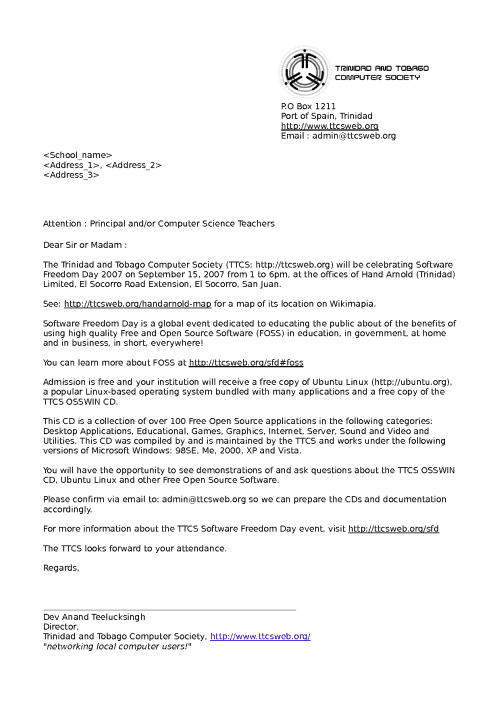
The next day, OpenOffice.org was used to do a mail merge, letters and envelopes were printed, letters were folded and put into the envelopes. The letters were
delivered to the local post office on Monday September 10th.September 10th-14th, 2007
A meeting was held on Wednesday September 12th, 2007. A more definite agenda of what would be done on SFD was agreed upon and also how to arrange the layout of the venue.
A promotional poster for the TTCS OSSWIN CD to put up at the SFD venue was done :
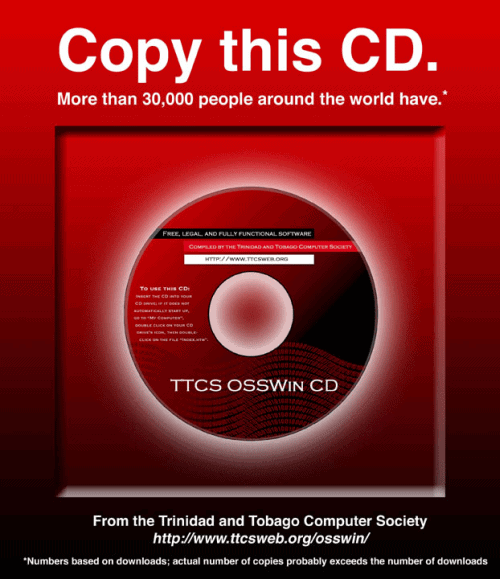
During this week, 80 TTCS OSSWIN CD labels were printed and 50 Ubuntu CD labels (using the Ubuntu CD artwork on the Ubuntu’s DIY Marketing page) were printed. The night before SFD, the printed CD-Rs were burned with the appropriate data. About 120 tri-fold brochures were printed.
September 15th, 2007 – Software Freedom Day
Arrived at the venue at 10am to prepare the venue in time for 1pm.
Event started at approximately 1.10 pm with around 27 people present.
- 1.15pm – An introduction to the TTCS what the TTCS does, highlighting our website at http://www.ttcsweb.org/.
- 1.35 pm – A Introduction to Free and Open Source Software (PDF ; 103K) presentation was done.
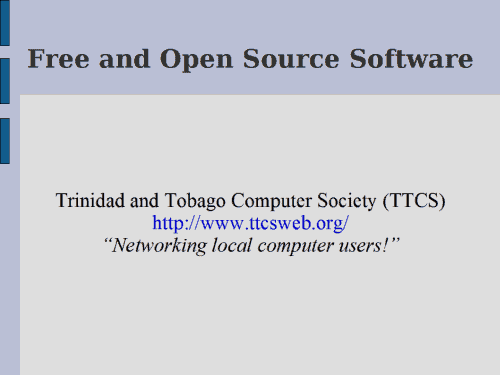
- 1.59pm – Overview of Software Freedom Day.
- 2.05pm – 2.18pm – Short break to prep for Ubuntu presentation; refreshments for the audience.
- 2.20pm to 3.15pm – Introduction to Ubuntu. Demonstration of a “live” CD. Gave overview of the Ubuntu desktop. Began a hard drive install of Ubuntu. Answered questioned from members of the audience while the installation was in progress Gave background to how Ubuntu came about ; what “Ubuntu” means (played the included video clip “What is Ubuntu”), with a brief biography of Ubuntu founder Mark Shuttleworth.
- 3.15pm to 3.30pm – Break While refreshments were served, many attendees asked several questions and made use of available machines to try Ubuntu.
- 3.31pm to 4.12pm : Demonstration of installed Ubuntu This machine was pre-installed with Compiz, restricted formats, Adobe Flash player, Nvidia restricted drivers Did an overview of the large number of applications available and how to add/remove applications. How security updates are performed Described how a new version of Ubuntu is available every 6 months. Discussion of proprietary formats (e.g. MP3, WMV) and why Ubuntu does not include support in the default install Described how to add support for proprietary formats. Showed OpenOffice.org and discussed the benefits of non-proprietary formats. Showed Compiz including effects such as the rotating cube and switching between applications.
- 4.15pm – 5.00pm overview of TTCS OSSWIN CD – open source software for Windows showed various OSS on the TTCS OSSWIN CD – OpenOffice.org, Tux Paint, Rainlendar, Mozilla Firefox and others
- 5:00 – 5:10 pm – Break
- 5:10 – 5:45 pm – more OSS for Windows from the TTCS OSSWIN CD Continued the overview of OSS for Windows from the TTCS OSSWIN CD.
- 5:45 – 6:00 pm – Book giveaway One member of the audience received The Official Ubuntu Book (2nd Edition) and another received the OpenOffice.org 2 Guidebook.
- 6:10 – end of event
Additional notes :
Seven persons directly helped with the running of SFD on that day and three other persons helped with the preparations leading up to SFD.
Forty one persons signed the attendance sheets, many were secondary school representatives who responded via email before SFD. A few were from the IT department of T&TEC (the local electricity company) who found out about the SFD event when a TTCS member who worked there, printed and showed the flyer to them.
Each attendee received :
- the TTCS trifold brochure
- a printed TTCS OSSWIN CD
- a printed Ubuntu CD (once stocks of the Ubuntu CDs from Softwarefreedomday.org were finished.)
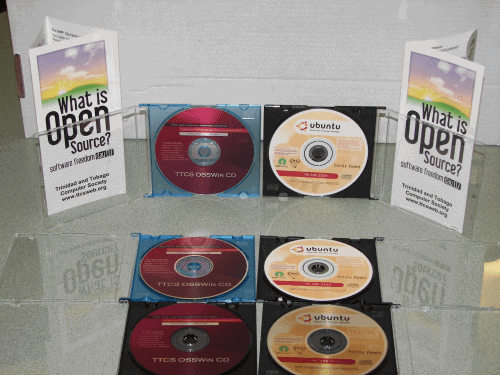
Photos and videos
Several photos from the Software Freedom Day event were uploaded to Flickr: http://www.flickr.com/photos/ttcs/sets/72157602189102284/
An 18 minute video of the Software Freedom Day 2007 event was created and available for viewing at Vimeo
Press coverage
Mark Lyndersay who writes BitDepth, (a weekly column about personal technology published in the Trinidad Guardian newspaper) was present at SFD 2007. He wrote about the TTCS SFD 2007 event in BitDepth #595 – ‘A slow march to freedom’, which was published on Tuesday September 25th, 2007 in the Trinidad Guardian.
- BitDepth #595 – ‘A slow march to freedom’ Mark Lyndersay’s personal site
- Trinidad Guardian BitDepth column 25 September 2007 (scanned image) (PNG ; 1118 x 1640 pixels ; 830K)
-

Answers from Flow (August 2007)
Introduction
The Trinidad and Tobago Computer Society met with Ian Serrao, Director of Network Services at Columbus Communications Trinidad
(Columbus is the parent company of Flow) at a TTCS Meeting on: Wednesday 22nd August 2007
These are some of the questions supplied by members (the title of this article was first “Questions for Flow”) and the answers provided by Flow (hence the change in title).
(more…) -
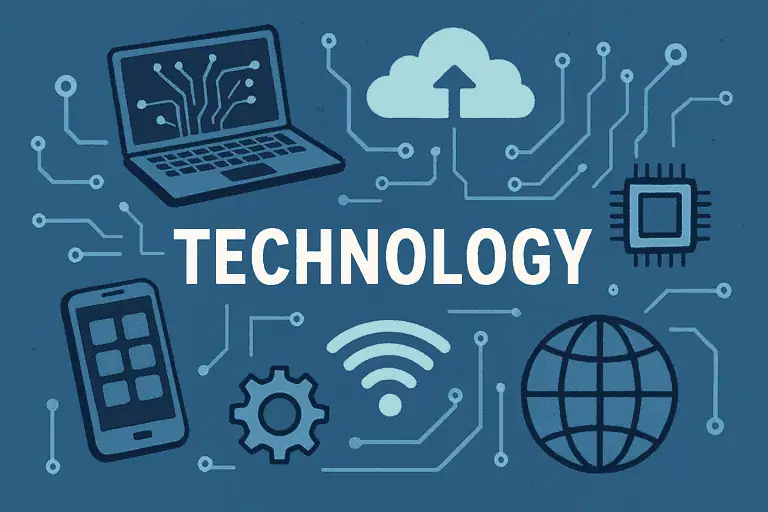
Digital Cable TV in Trinidad
A brief history
Cable television service on the island of Trinidad was originally provided by several independent cable television companies (AJ Cable, Cableview, Rainbow Cable, Transcable). These companies were eventually merged to form the Cable Company of Trinidad and Tobago Limited (CCTT). In February 2006, it was annnounced that Columbus Communications Limited, a multi-national telecommunications company with investments throughout the Caribbean, had purchased CCTT. Columbus stated that the island would be upgraded to an all digital cable television service as it prepared to offer “triple-play” service, that is, television, data (Internet access) and voice phone service over the same line. According to its website, several areas were to be upgraded by the end of 2006. There were delays and only now (2007) are those areas being fully upgraded to digital cable television service.
At this time (2007), Flow/Columbus Communications Limited does not provide cable television service on the island of Tobago.
(more…) -

The Role of Open Source Software in Trinidad and Tobago
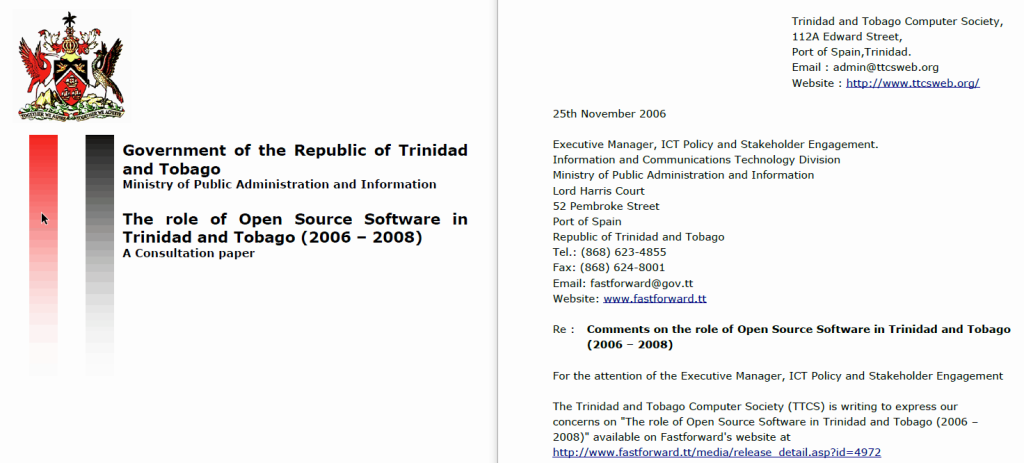
In late October 2006, the Ministry of Public Administration and Information (MPAI) has published a discussion paper on “the role of Open Source Software in Trinidad and Tobago”. From the document
“The aim of this paper is review the role of the Open Source Software (OSS) model within the broader societal goals of economic and social development. The issues discussed herein shall be critical to further engage the Public Service and the wider national ICT sector in developing an action plan going forward. Such a national discourse and action plan will go a long way in meeting the objectives of fastforward, the National ICT Plan, and the regional action plan for the information society, eLAC2007.
In pursuing the above aim, this consultation paper attempts to: (i) address the major risks cited against the use of the OSS model; (ii) identify uses of the OSS model in various segments of the industry; and (iii) gain feedback proposing a way forward, with opportunity and threats, for OSS in the developmental objectives of Trinidad and Tobago.”
- Download consultation paper “The role of Open Source Software in Trinidad and Tobago (2006 – 2008)” (PDF ; 187K)
- View Trinidad and Tobago Computer Society (TTCS) comments on “The role of Open Source Software in Trinidad and Tobago (2006 – 2008)” (PDF ; 154K)
-

Internet Bandwidth Management
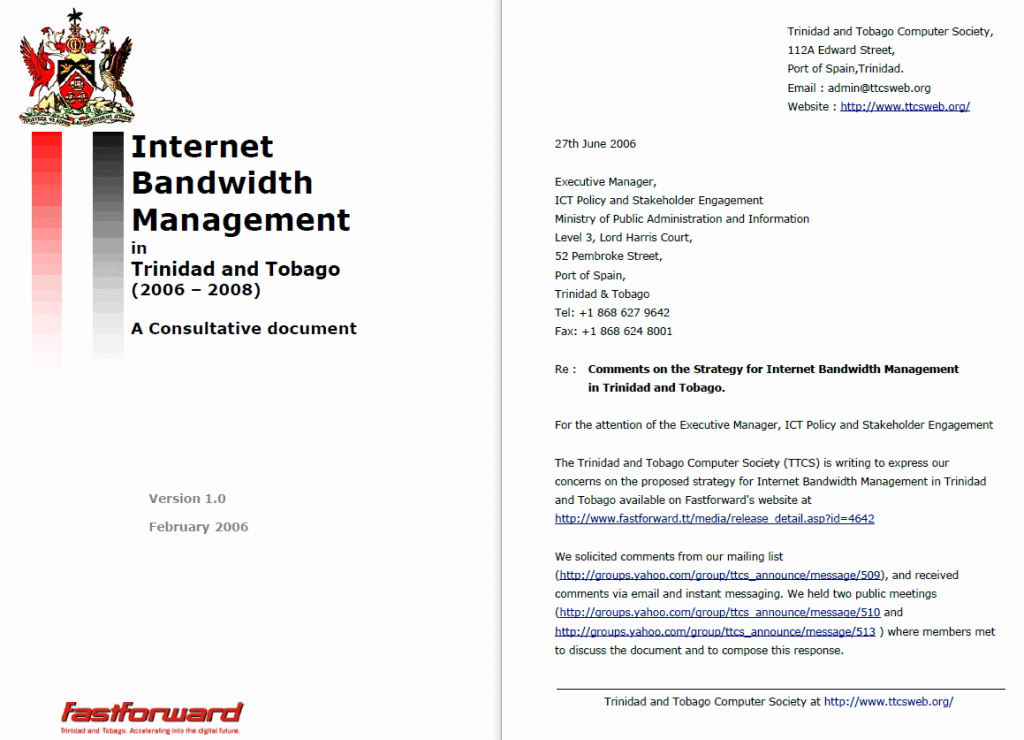
The Internet Bandwidth Management proposed policy was released for comment in June 2006 by the Ministry of Public Administration and Information (MPAI).
The Internet Bandwidth Management document makes these points :
- that the cost of external Internet bandwidth and the hosting of content outside of Trinidad and Tobago is detrimental to the local economy and is a hurdle to e-commerce and content development and to the success of Government’s Fastforward initiative.
- that methods should be taken to reduce the usage of external Internet bandwidth. These include
- the hosting of content locally in Trinidad and Tobago which would
- act as a catalyst for local content being released under Creative Commons and for the marketing of proprietary content.
- create a robust foundation for e-Business/e-Commerce.
- act as a catalyst for use of local content based services such as data warehousing and tele-medicine.
- employ techniques for efficient utilisation of bandwidth such as compression of content/data and caching servers.
- local ISPs peering through a national IXP to facilitate local hosting.
- the hosting of content locally in Trinidad and Tobago which would
- Read the Ministry announcement of the proposed Internet Bandwidth Management strategy.
- Download the Internet Bandwidth Management (PDF ; 41 pages ; size: 508K)
- View/Download Trinidad and Tobago Computer Society (TTCS) comments on “Internet Bandwidth Management” (PDF ; size 140K)
In late September 2006, the the Ministry of Public Administration and Information (MPAI) published its compilation of comments and the MPAI’s responses to
- View Internet Bandwidth Mangement DORs Matrix (PDF ; 372K)
On November 1st, 2006, the Ministry of Public Administration and Information (MPAI) held a workshop to discuss “Internet Bandwidth Management” Strategy with interested stakeholders.
At this workshop, the MPAI presented two broad proposals to address the issue of Internet Bandwidth Management :
- Development of an Internet eXchange Point (IXP) :
- how such an IXP be developed and managed
- the best location for an IXP
- local hosting of local content :
- what should be done to promote local content development
- how should domestic hosting be developed and managed
- where would such a local hosting facility be located
The MPAI has released a summary of the workshop.
- View/Download Overview of Internet Bandwidth Management Consultation (PDF ; 77K)
